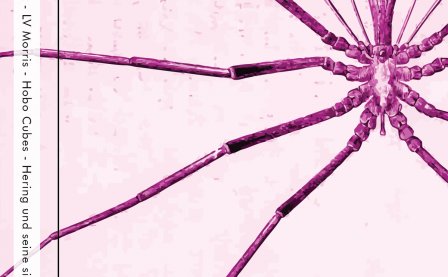Hobo Cubes, the project of experimental visual and sound artist Francesco de Gallo, is a relentless investigation of sound waves. Some of these waves lull us into their vast, electric marshes, while others tower over us like avalanches, thick and buzzing with ferocity, reducing sound to an absolute kernel. Think of zombie games, horror movies, and haunted spaces. Or think of the snow falling on the Montreal streets at night, the hum of empty electric factories, and the tinkle of a faucet in an underground bathroom. Behind these objects is the physics of music: hertz and megahertz, amplitude, harmonics, frequency, attack, decay, sustain, release. Apex Ideals brings together these physical characteristics of sound; it reminds me of a quote from Robert Smithson, the famed sculptor, who wrote, “my sense of language is that it is matter and not ideas — i.e., ‘printed matter.’” The same can go for sound. This album is an aural dissertation for such logic.
Listening to Apex Ideals is like being on a hunt. Our vision fades away, and we scan the terrain, looking — with our ears instead of eyes — for disturbances in the architecture. In video games, we go through room after room after room with a gun in our hand, listening closely for the smallest sound. This album is one of those instances where narrativity — the representation of connected events — is an important psychological factor while listening, if only because contextualizing this album as suitable game-music material happens so automatically.
But because Apex Ideals isn’t intended for a video game, and because its primary target audience is a non-virtual, “real” audience, there’s a feeling of potential virtuality hidden in the mist. Creating noise like this makes listening to non-recorded noise become strengthened by the beauty of analog minimalism; it makes passing by an unmarked factory at night an active, participatory experience. And moreover, this album questions the divide between noise and music, as well as industrialization’s quest to totalize the ecologies of urban decay.
Condensation is the centripetal force of these nine songs. “Fluidity” begins with an electronic rain, moving into a skittish mess of winglike flutters; “Unit” echoes from an underground sea of chaos, with sounds of semi-transparent, flexible sheets of hornlike material beating amidst the sounds of insane asylum victims; “What Seemed To Be Nothing” blurs us in a blizzard of dusty, clicking, simulated whitethroats. It’s a snowy, slow record that seems to pass in an instant. It does more for altering the idea of physical space than one imagines, and that alteration goes back into how we experience our immediate ambient space. The limits of space and time are here while we listen, intended to be celebrated for their glorious constraints.
More about: Hobo Cubes




